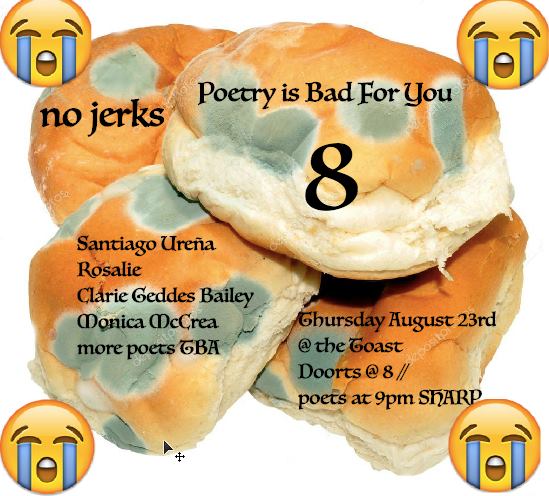For me, poetry has always been something to study, to sit with alone and pore over the carefully constructed language. I’ve always been of the mind that poetry is this dense web of words with specific meaning tucked away somewhere deep inside, and the duty of the reader is to navigate through, in search of that clear meaning that makes the words snap into place. Of course, I know that my view of poetry erases any emphasis on the act of reading it aloud, of sharing it in specific time and place, of the communal experience that comes from hearing rather than reading. And I know that that emphasis on the oratory element of poetry has always been essential to the form, that poetry predates writing systems, that there is something more in the experience of poetry than can be found in what is written.
So I went to the Toast Collective for the eighth edition of Poetry Is Bad For You, a somewhat regular showcase of local poets reading their work aloud, to get a glimpse at what poetry can be away from the page.
The Toast was full, but still cosy, with every seat filled by those eager to hear what the night’s six poets had to say. With a brief introduction to the series and land acknowledgment by co-host Eirinn, the first poet stood up on stage. Santiago Ureña started by saying that they had one of Bach’s Cello Suites stuck in their head. “Just pretend that it’s playing in the background as I read.” Santiago went on to read a few long, prosy poems that dealt with crying in public, childhood queerness and what would happen to the world if humans were to disappear. Imbued with a sense of somber magic, only emphasized by a soft but commanding voice, Santiago’s reading was the perfect way to get the night started.
Next up was Kira Mok, who stated right off the bat that this was their first time reading in public. Cheered on by the warm audience, Kira dove into a markedly different style than Santiago’s: short, image-heavy bursts of poetry — only a few sentences per poem — that explored themes of intergenerational trauma and visceral depictions of psychosis. The thematic heaviness was beautifully counteracted by Kira’s light and mostly deadpan comments between each piece.
After a short intermission and a shuffling forward by the audience, Selina Boan got up to read, her third poem the highlight of the evening. What started as a found poem, bringing together various headlines and clippings from articles about the Trans Mountain pipeline expansion, became a collage of personal and familial snippets of narrative, while Selina slowly counted up the billions of dollars spent buying the expansion project, trying to “flip a pipeline like a house.”
Monica McCrea was up next, another first-time reader, whose poems were varied in style and length. Their self-admitted “assignment for school” titled “Instructions for a Straight Man Desiring a Queer Woman,” was at once a passionate derision of toxic masculinity and a declaration of the power and magic of queerness. Monica’s final piece, “Femme,” was a thematic echo, detailing their relationship with the femme identity.
Beginning with a list-like poem called “My Body,” chronicling the many ways in which she, intentionally or not, abstains from self-care, Claire Geddes Bailey’s reading was measured in an incredible way. Her second piece, another highlight of the evening, was more akin to prose than any poems shared thus far. It was a fragmented autobiographical narrative careening through ideas of homesickness, artistic creation and unfulfilled past relationships, presented through a series of understated but rich images of encountering moose on the shore and hearing from a friend about them seeing a person laying down on the unstable ice of the North Saskatchewan River. Claire’s unwavering voice exuded a kind of quiet confidence that made for a truly remarkable experience.
Finally, Rosalie wrapped up the night, with selection of poems most markedly in the Slam tradition as any of the preceding readers. Their quick and emotionally saturated diction made for a poignant set of poetry, including an ode to Funky Winkerbeans, a meditation on the weight of a name in relation to their Acadian heritage and a response to the apathy of the generations of people above towards the sensitivity of those trying to make the world better.
As I walked away from the Toast, having finally been a part of a collective poetic experience, I understood a little better. If I were to have read those same pieces, I would’ve had a very different idea of what those poets were trying to say. Hearing their inflections, feeling the mood in the room twist alongside the words, seeing how the people around me responded to the poems, I knew that a new world of poetry had been opened up to me. Poetry may be bad for me, but it sure felt good to be a part of it.


